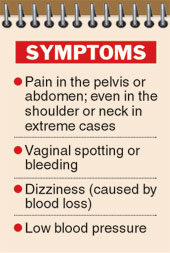 |
Pregnancy or tumour? That was the question asked by both family members and doctors when 31-year-old Sunayana Sen (name changed) was wheeled into a hospital a few days ago.
Opening the abdomen, the doctors were shocked to find a foetus with developed eyes and nose. ?It was a rare sight ? a foetus in the abdomen, instead of the uterus,? recalled V. Lakshman, gastrointestinal and laparoscopic surgeon at Kothari Medical Centre and Research Institute, who operated on Sunayana.
?It?s an extremely uncommon case, known as ectopic pregnancy. This is a condition where a fertilised egg is implanted outside the uterus. In this case, it happened in the abdomen, but it can also happen in the Fallopian tube, ovary or cervix,? he explained.
Incidence of ectopic pregnancy across the world is 1.09 for every 10,000 births. And of every 1,000 ectopics, 9.2 are abdominal pregnancies (as in Sunayana?s case).
When Sunayana arrived at hospital, she had missed her periods for two consecutive months. She also developed a painful lump in the appendicular region and was running a high fever and suffering from pain on the right side of the abdomen. Mother of four, she had also undergone a failed abortion at a private centre.
Sunayana was put under the scalpel after Lakshman and his team diagnosed appendicular abscess caused by a ruptured appendix.
?We drained more than 300 ml of thick pus from the appendicular region. Probing further, we came across a foetal head with formed eyes, ears and nose in the abdomen. Its gestational age was more than 8-10 weeks,? Lakshman recalled. The uterus looked normal, except for a weak spot through which pus was oozing out.
Sunayana can consider herself lucky, as ?abdominal pregnancy is considered to be life-threatening, with the maternal mortality rate as high as 18 per cent,? the surgeon pointed out.
On most occasions, the ectopic pregnancy can be difficult to diagnose because the symptoms often seem similar to normal early pregnancies. These include missed periods, breast tenderness, nausea, vomiting and frequent urination.











